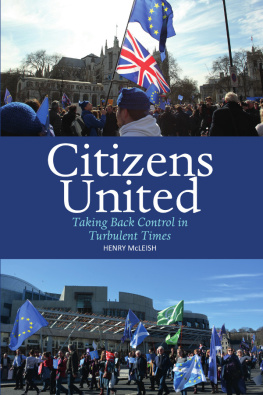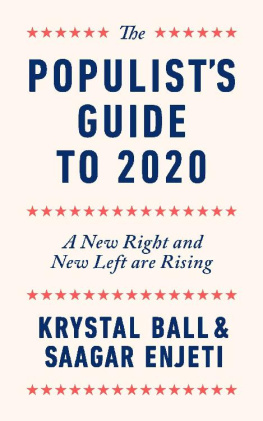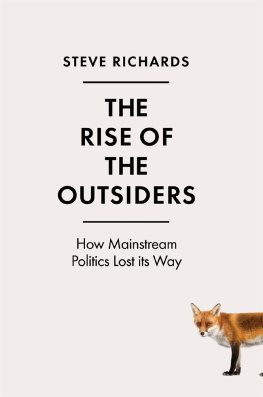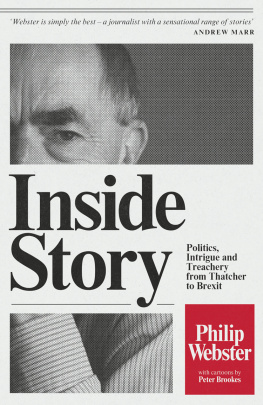HISTORY REPEATING
Sam Wilkin is a senior advisor to Oxford Analytica, a geopolitical analysis firm that counts more than 25 world governments among its clients. He is also a senior advisor to Oxford Economics, one of the world's foremost global forecasting consultancies. His previous book is Wealth Secrets of the One Percent.
HISTORY REPEATING
WHY POPULISTS RISE AND GOVERNMENTS FALL
SAM WILKIN

First published in Great Britain in 2018 by
Profile Books Ltd
3 Holford Yard
Bevin Way
London
WC1X 9HD
www.profilebooks.com
Copyright Sam Wilkin, 2018
The moral right of the author has been asserted.
All rights reserved. Without limiting the rights under copyright reserved above, no part of this publication may be reproduced, stored or introduced into a retrieval system, or transmitted, in any form or by any means (electronic, mechanical, photocopying, recording or otherwise), without the prior written permission of both the copyright owner and the publisher of this book.
A CIP catalogue record for this book is available from the British Library.
eISBN 978 178283 410 6
for Caroline
Introduction
Let us imagine, dear reader, that you wish to topple the establishment. Imagine you are an outsider political candidate, despised in Washington or Westminster; or perhaps a campaigner for democracy in an authoritarian country like China or Cuba; or even a revolutionary militant, seeking to depose a corrupt and unjust regime. Imagine that you have been seized by an overpowering vision of yourself leading the people to a better future, swathed in robes of white cotton walking forth upon rose petals scattered by youths singing songs in your praise.
Or perhaps that is just me. Regardless, I have bad news. Let me put it bluntly: your fellow citizens are sheep. Lets remake this great nation! you will cry. Baa, they will bleat contentedly, distracted by salty snacks and Instagram. They neither know nor care that the system is failing them. Someone could burst through their front door and shave them, and they would stagger hairless to their feet and return to snacking on the sofa. Such ovine complacency is a problem for those who seek to rally mass movements against the political establishment; indeed, it has been a problem for all leaders who dream of political change, from those who fought to end racial segregation in the American South to those who toppled the Russian government in 1917: there is just not much net gain for the common man in undertaking political action. Struggling against the status quo entails personal effort for a widely shared reward. We all want a better world, but no one wants to give up their weekend for it.
But do not lose hope: the people can be mobilised. When the UKs referendum on Brexit was held, for instance, some 2.8 million people turned out to vote who had not voted in the previous election; many of them had never voted in their lives. Whether one was appalled or elated by the referendum outcome, it was an extraordinary surge in political participation. And it was no less extraordinary when, in the first post-Brexit general election, turnout among eighteen to twenty-four-year-olds rose by 16 percentage points; and turnout among ethnic minorities rose by six points. What force could compel millions of hitherto uninterested people to rise up from their sofas and participate in politics?
These participation surges are examples of what I will call mobilisation politics, and they can produce a very different politics than that to which we have become accustomed. It is the politics of Brexit, of Donald Trumps victory, of the movements against them, and of great political uprisings throughout history. This book explains how such moments of turmoil come about, by telling the stories of leaders who wanted rebellions, mass uprisings, or votes against the establishment, and got them occasionally to their own great surprise. We have all heard about a butterfly flapping its wings and causing a hurricane. In politics, it is far more common that the hurricane was already building, and a butterfly that happened to be flapping around nearby has loudly claimed credit. Political leaders put a face on events, but it is underlying social, political and economic conditions that give mass movements their strength. The leaders who have led momentous political changes tend to draw conclusions about the size of their wings, but even the most delicate flutter can produce a great storm if conditions are right.
But only if conditions are right. The sexiest revolutionary of all time, Che Guevara, once claimed that The revolution is not an apple that falls when it is ripe. You have to make it fall. He then disproved his own thesis by dying while attempting to overthrow the government of Bolivia. Todays political leaders, no matter how much we love or hate them, are no less the victims or beneficiaries of broader conditions. Many people no doubt spent 2017 chanting incantations in magic Latin (egomanius incarcerus! referendi reverso!). But would such magic really fix politics? Take the case of Italy, where, during the early 2000s, a wealthy businessman became prime minister and then proceeded to alienate much of the countrys political establishment. During the Eurozone debt crisis, the Italians got rid of him. A few years later, the most popular opposition party in Italy was led by a former professional comedian who wanted a referendum on leaving the Euro. Unless underlying conditions are addressed, plus a change
But what kinds of conditions produced the turmoil of 2016? Two types are most frequently mentioned, but neither is sufficient to explain these surprising political events. The first is economic distress. But, as we shall see, the link between economic hardship and political unrest is not that simple. If hardship caused uprisings, it would have been peasants who led the Russian Revolution rather than comparatively well-off urban workers. If hardship caused uprisings, there would be a rebellion attempted in North Korea every day (perhaps unsuccessfully, given the North Korean governments willingness to oppress its people). As we shall see, even the extremes of personal hardship do not, on their own, cause people to rise up against the political establishment.
The other underlying condition that is often mentioned is psychological distress. It is said that people who turned out for the Brexit vote or supported Donald Trump were enraged by an assault on their values; or were reacting to a perceived threat from ethnic or religious minorities; or perhaps longed for a more authoritarian leader. But if disputes over values were the cause of recent political events, surely the non-voters who voted for Brexit would have turned out to vote in the previous UK general election as well? Presumably, peoples values did not change that much between the 2015 general election and the 2016 Brexit referendum. Hence conflicts over values cannot, on their own, explain why 2016 was such an unusual year.
But if economic distress, psychological angst, and the size of Boris Johnsons wings cannot explain the surprising events of 2016, what can?
Social science
I began thinking about this book some time ago, because in my profession of political risk analysis, it has long been apparent that beneath the apparent dullness of modern politics the all-but-inter-changeable parties and policy platforms the wheels have slowly been coming off. Perhaps, I thought, people will want to read a book about why this happens.
Take, for instance, the country risk ratings compiled by the financial journal
Next page











